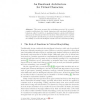Free Online Productivity Tools
i2Speak
i2Symbol
i2OCR
iTex2Img
iWeb2Print
iWeb2Shot
i2Type
iPdf2Split
iPdf2Merge
i2Bopomofo
i2Arabic
i2Style
i2Image
i2PDF
iLatex2Rtf
Sci2ools
131
click to vote
STORYTELLING
2005
Springer
2005
Springer
An Emotional Architecture for Virtual Characters
This paper presents the mechanisms proposed by a generic cognitive architecture for virtual characters with emotional influenced behaviors, called cognitiva, to maintain behavior control at will without giving up the richness provided by emotions. This architecture, together with a progressive specification process for its application, have been used successfully to model 3D intelligent virtual actors for virtual storytelling. 1 The Role of Emotions in Virtual Storytelling Traditionally it was considered that intelligent behaviors could only be produced from pure rational reasoning processes. However, everyday experience shows that pure rationality fails when trying to explain many human behaviors, in which the emotional component has a decisive weight. Although quite a lot of efforts have been made to consider emotions in computational models of cognitive processes, emotion is still perceived by many as a non-desirable quality for a computational system [1]. Emotion, mood, personal...
Related Content
| Added | 28 Jun 2010 |
| Updated | 28 Jun 2010 |
| Type | Conference |
| Year | 2005 |
| Where | STORYTELLING |
| Authors | Ricardo Imbert, Angélica de Antonio |
Comments (0)

